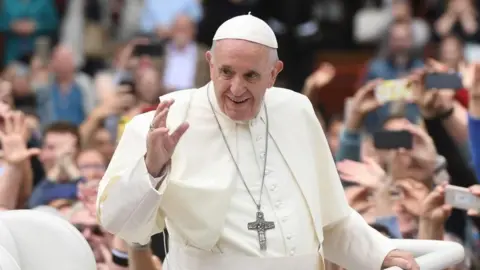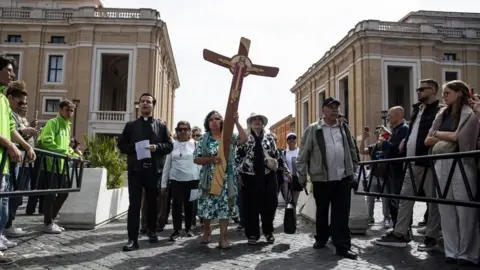Vatican announces death of Pope Francis aged 88
 PA Media
PA MediaPope Francis, the first Latin American leader of the Roman Catholic Church, has died at the age of 88.
"This morning at 07:35 local time (05:35 GMT) the Bishop of Rome, Francis, returned to the home of the Father," Cardinal Kevin Farrell said in the statement, published by the Vatican.
His death comes after he appeared at St Peter's Square on Sunday to wish "Happy Easter" to thousands of worshippers.
Pope Francis, born Jorge Mario Bergoglio in Argentina, was discharged from hospital last month after five weeks of treatment for an infection that led to double pneumonia.
"He taught us to live the values of the Gospel with fidelity, courage and universal love, especially in favour of the poorest and most marginalised," Cardinal Kevin Farrell continued his statement.
"With immense gratitude for his example as a true disciple of the Lord Jesus, we commend the soul of Pope Francis to the infinite merciful love of the One and Triune God."
Tributes from around the world have been pouring in, including from King Charles III who met with the Pope privately earlier this month during his state visit to Italy.
The King said he was "deeply saddened" to hear of his death, adding: "His Holiness will be remembered for his compassion, his concern for the unity of the Church and for his tireless commitment to the common causes of all people of faith, and to those of goodwill who work for the benefit of others."
Meanwhile, the acting head of the Church of England, the Archbishop of York, described him as a "holy man of God" who was "also very human".
"Francis's whole life and ministry was centred on Jesus who comes among us not to be served, but to serve," Stephen Cottrell said in a statement.
US Vice-President JD Vance, who met the Pope on Easter Sunday, said his "heart goes out" to Christians.
"I was happy to see him yesterday, though he was obviously very ill," he said.
The White House said in a post on X: "Rest in Peace, Pope Francis."
Italy's Prime Minister Giorgia Meloni praised him as "great man" and said she had the privilege of enjoying his friendship, advice and teachings.
 EPA
EPAHundreds of thousands of people gathered at St Peter's Square on Easter Sunday, where Pope Francis made what would be his last public appearance. He was seen in his wheelchair waving from the balcony of St Peter's Basilica to cheering crowds.
"Dear brothers and sisters, happy Easter," he said.
In his Easter blessing, delivered by a clergy member, he said: "There can be no peace without freedom of religion, freedom of thought, freedom of expression and respect for the views of others."
"What a great thirst for death, for killing we see in the many conflicts raging in different parts of the world."
The governing of the Church will now be handled by the College of Cardinals, its most senior officials, until the new Pope is chosen. There are currently 252 Catholic cardinals, 138 of whom are eligible to vote for the new Pope.
They will be summoned to a meeting at the Vatican, followed by the conclave, as the election is known.
The Pope had struggled with his health in recent months, having spent five weeks in hospital with pneumonia in both lungs.
During his time in hospital, he presented "two very critical episodes" where his "life was in danger", according to one of his doctors.
He has suffered a number of health issues throughout his life, including having part of one of his lungs removed at age 21, making him more prone to infections.
Francis's papacy heralded many firsts and while he never stopped introducing reforms to the Catholic Church, he remained popular among traditionalists
He was the first Pope from the Americas or the southern hemisphere. He was also the first non-European Pope in centuries, after Syrian-born Gregory III who died in 741.
He was also the first Jesuit to be elected to the throne of St Peter. Jesuits were historically looked on with suspicion by Rome.
Francis's predecessor, Benedict XVI, was the first Pope to retire voluntarily in almost 600 years and for almost a decade the Vatican Gardens hosted two popes.
Pope Francis was born in Buenos Aires, Argentina, on 17 December 1936. His parents had fled their native Italy to escape fascism. In his early life, he worked as a nightclub bouncer and floor sweeper, before graduating as a chemist.
Ahead of becoming the head of the Catholic Church in 2013, he presented himself as a compromise candidate by appealing to conservatives while attracting the reformers with his liberal stance on social justice.
His early actions as Pope included washing the feet of the elderly and prisoners and advocating for the rights of refugees and migrants.
But on many of the Church's teachings, Pope Francis was a traditionalist. There were warm words in favour of some kind of same-sex unions for gay couples, but Francis did not favour calling it marriage. This, he said, would be "an attempt to destroy God's plan".
Shortly after becoming Pope, he took part in an anti-abortion march in Rome - calling for rights of the unborn "from the moment of conception".
